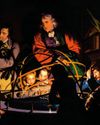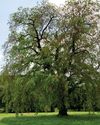
UNTIL quite recently, Cimabue's Madonna Carried in Procession through the Streets of Florence (1853-55) hung on a wall above the National Gallery main entrance stairs. Many visitors probably passed beneath without noticing it. The same holds true of the position that its creator Frederic, Lord Leighton (1830-96) holds in the British art world of today: central to its history, yet largely ignored.
Nobody overlooked him in his 19th-century heyday. When Cimabue's Madonna was viewed at the Royal Academy (RA) in 1855, the Art Journal described it as 'the one picture in the collection that will mark this year... as an epoch in British Art'. Queen Victoria purchased it for 600 guineas and Leighton eventually became one of the most fashionable artists of her reign. Of sufficient means not to depend entirely on selling canvases, he produced technically excellent, opulently staged historical and mythological works and moved with ease among the aristocracy. His studio house in London's Holland Park, Kensington, W14 (now Leighton House museum), became a palace of art notable for its Moorish décor. President of the RA from 1878, he was made a baronet in 1886, elevated to the peerage one day before his death (as Lord Leighton, Baron of Stretton, he is the only British artist so honoured) and given a funeral in St Paul's.
It's not difficult to see why his monumental paintings, with their polish and obscure classical references, are less admired today. He was a contemporary of Manet and Degas by the time of Leighton's death, Gauguin had already sailed for the South Seas and Picasso's Blue Period was five years ahead -yet he appears to be from a different age.
この記事は Country Life UK の March 22, 2023 版に掲載されています。
7 日間の Magzter GOLD 無料トライアルを開始して、何千もの厳選されたプレミアム ストーリー、9,000 以上の雑誌や新聞にアクセスしてください。
すでに購読者です ? サインイン
この記事は Country Life UK の March 22, 2023 版に掲載されています。
7 日間の Magzter GOLD 無料トライアルを開始して、何千もの厳選されたプレミアム ストーリー、9,000 以上の雑誌や新聞にアクセスしてください。
すでに購読者です? サインイン

A leap in the dark
The primal play of light and shadow, whether in Leonardo's ever-so-subtle sfumato or Caravaggio's dramatic contrasts, has shaped Western art, as Michael Hall reveals

Beauty and the blimp
Inflammable airships may be gone, but a new hybrid aircraft, capable of delivering eco-friendly aviation, is set to take to the skies with a bang, finds Charles Harris

Three wishes for food and farming
Royal hedge planting, the terrible toll on Ukrainian farming and a maiden speech

Seeing the wood for the trees
Scotland's much-evolved forestry industry has become a focus for clever investors

Let's fall in love
Birds do it, bees do it, even educated fleas do it. Laura Parker finds that, when it comes to creatures mating for life, persistence, patience and a little dad dancing are key to success

Back from the dead
THREE Wentworth elm saplings have been planted in the grounds of the Palace of Holyroodhouse, Edinburgh, and on the Highgrove estate in Gloucestershire-29 years after what was thought to be the lastknown Wentworth elm died.

A man among men
What makes a master? Beloved of the commercial art world, handled warily by art historians, the word has long been opaque. Michael Prodger investigates its many meanings-and discovers that being male confers an unfair advantage

Unearth one of life's luxuries
Black diamonds are a girl's best friend this Valentine's Day, with Périgord truffle-based skincare from TRUFFE

Adventure awaits
Spend an unforgettable family holiday on the Benmore Estate and experience some of Scotland's finest wildlife and sporting activities

Let the art rule the head
Despite being a world leader in everything from jewellery to fashion and music, the UK is failing to nurture creativity at school and in regional centres. Tristram Hunt, director of the V&A Museum, calls for an urgent review